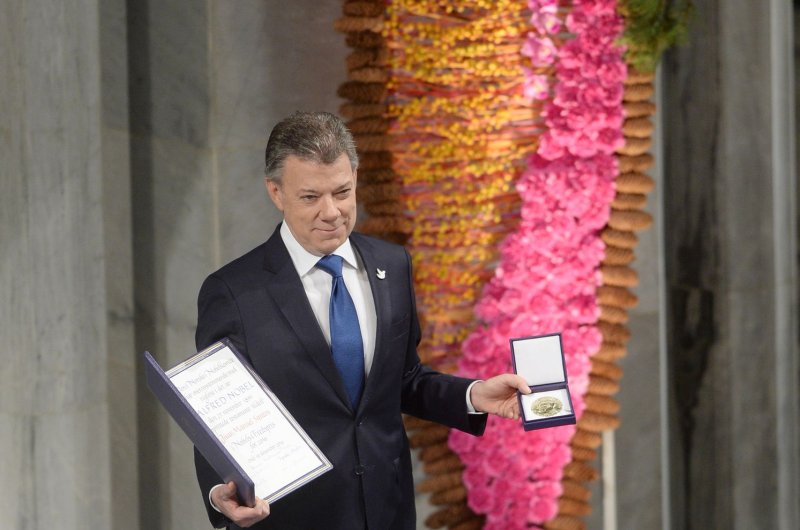1 of 6 | Colombian president Juan Manuel Santos holds the Nobel Peace Prize Award at City Hall in Oslo on December 10, 2016. Santos was awarded the 2016 Nobel Peace Prize for reaching an accord with Marxist rebels to end a 52-year civil war. Photo by Rune Hellestad/UPI |
License Photo
OSLO, Norway, Dec. 10 (UPI) -- Colombian President Juan Manuel Santos accepted the Nobel Peace Prize after reaching a deal to end one of the longest-running wars in Latin America.
Santos accepted the prize at the award ceremony in Oslo, Norway after reaching a deal to end a five decade-long conflict with rebel group Revolutionary Armed Forces of Colombia, known as FARC, according to CNN.
"After six years of serious and often intense, difficult negotiations...this agreement marks the beginning of the dismantling of an army and its conversion into a legal political movement," he said.
While Santos was awarded the Nobel Peace Prize for negotiating peace with FARC, the deal was passed by Colombia's congress despite an October referendum in which 50.2 percent of Colombians voted against the agreement.
"Like life itself, peace is a process with many surprises," Santos said. "I was determined to turn this setback into a chance to develop the widest possible consensus for reaching a new agreement."
The conflict killed more than 260,000 people while also leaving millions displaced within the country. Santos deviated from his prepared speech to encourage representatives for victims to stand and be recognized, the BBC reported.
"I have served as a leader in times of war - to defend the freedom and the rights of the Colombian people - and I have served as a leader in times of making peace," he said. "Allow me to tell you, from my own experience, that it is much harder to make peace than to wage war."
Santos also used the platform to say it is "time to change our strategy" in the so-called war on drugs.
"We have moral authority to state that, after decades of fighting against drug trafficking, the world has still been unable to control this scourge that fuels violence and corruption throughout our global community," he said. "The manner in which this war against drugs is being waged is equally or perhaps even more harmful than all the wars the world is fighting today, combined."















